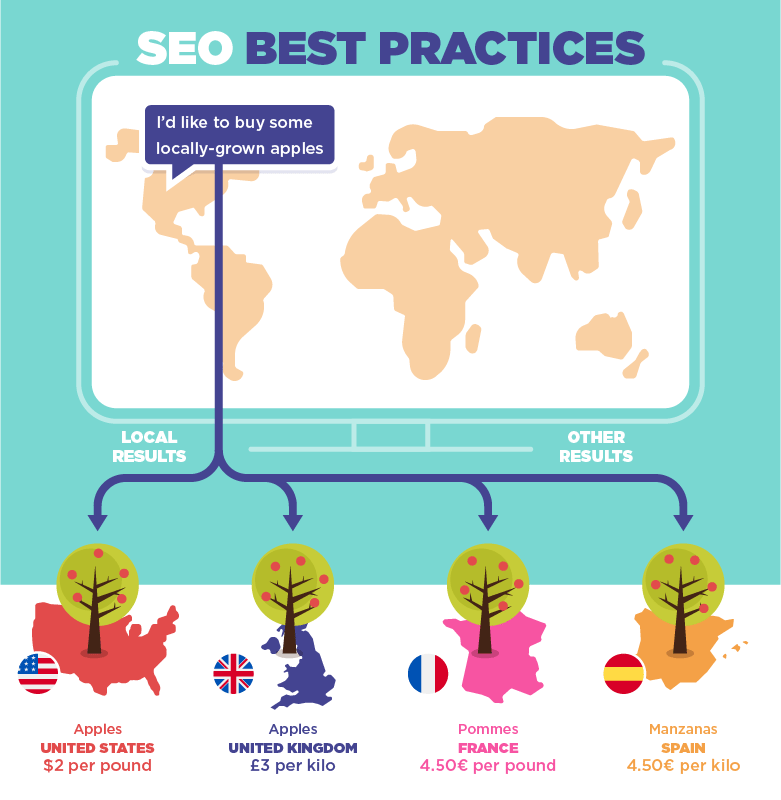Breaking Boundaries: International SEO Techniques for International Supremacy
Breaking Boundaries: International SEO Techniques for International Supremacy
Blog Article
Browsing the Digital Landscape: Leveraging International SEO for Cross-Border Success
In today's interconnected electronic world, companies are significantly looking beyond borders to take advantage of worldwide markets. Leveraging seo (SEO) strategies customized for global target markets is vital for achieving cross-border success. The intricacy of navigating the digital landscape on a worldwide range requires a nuanced technique, from comprehending the principles of International SEO to implementing geotargeting and multilingual key phrase strategies. As firms make every effort to broaden their reach and exposure across different areas, optimizing website structures and keeping an eye on cross-border performance become essential elements of a successful global SEO technique.
Comprehending International Search Engine Optimization Fundamentals
Navigating the intricacies of global SEO calls for a solid understanding of basic principles to properly expand on the internet visibility across boundaries. One important aspect of global Search engine optimization is recognizing the significance of localization.
Furthermore, having a clear understanding of geo-targeting is vital. This includes showing to online search engine the particular nations or regions an internet site is targeting. Applying hreflang tags is one way to communicate this details, guaranteeing that the correct variation of a webpage appears in the search results page for an individual in a specific area.
Additionally, understanding the impact of neighborhood online search engine and social networks systems is crucial for worldwide SEO success. While Google is dominant in numerous regions, countries like China have their own search engines like Baidu, calling for tailored techniques for each platform to maximize online visibility (International SEO).

Targeting Multilingual Keyword Methods
Developing multilingual keyword approaches is necessary for properly getting to varied worldwide audiences and making best use of online exposure throughout different etymological regions. When targeting multilingual keyword methods, it is important to carry out detailed research to understand the specific search terms and phrases utilized by the target market in each etymological area. This entails not just converting key phrases but likewise considering cultural nuances, local languages, and search fads distinct per target audience.
To create a successful multilingual keyword technique, it is vital to focus on relevance and search intent. Search phrases should line up with the web content on the internet site and resonate with the cultural context of the target audience. Making use of tools such as Google Search Phrase Planner, SEMrush, or Ahrefs can help identify high-performing key phrases in various languages and evaluate their search quantity and competition degree.
In addition, tracking and examining the performance of multilingual key words consistently is essential for maximizing and improving the strategy over time. By constantly adjusting to modifications in search actions and fads, companies can improve their on the internet presence and attract even more international web traffic to their internet sites.
Implementing Geotargeting and Hreflang Tags
When aiming to enhance global search engine optimization techniques, incorporating geotargeting and hreflang tags is essential for optimizing website presence across different regions. Geotargeting entails customizing web content to specific places, making certain that customers in various areas get relevant details. By implementing geotargeting, companies can improve their regional search positions and attract region-specific website traffic.

Optimizing Site Framework for International Exposure
To even more boost international Search engine optimization techniques past geotargeting and hreflang tags, optimizing the site framework is necessary for attaining worldwide exposure and optimizing reach across different areas. A well-structured internet site not only enhances user experience yet additionally assists in search engine crawlers in comprehending the web content and context of the website.
Furthermore, creating language-specific subdirectories or subdomains can help look engines provide the ideal special info version of the website to customers based on their language preferences, further boosting the general user experience. Furthermore, maximizing link frameworks to consist of pertinent search phrases and geotargeted terms can boost the site's visibility in different regions. By structuring the web site efficiently for international audiences, companies can boost their possibilities of bring in international website traffic and increasing their reach throughout borders.

Monitoring and Evaluating Cross-Border Performance
Reliable surveillance and studying of cross-border efficiency is vital for reviewing the success of global search engine optimization strategies and identifying possibilities for improvement in global reach and visibility. By carefully tracking crucial performance indicators (KPIs) throughout various markets, services can acquire important insights right into the performance of their cross-border SEO efforts. Keeping an eye on metrics such as natural web traffic, keyword rankings, conversion prices, and bounce rates can supply a detailed sight of just how well a site is performing in numerous regions.
By contrasting performance across various countries, regions, or languages, firms can pinpoint successful strategies and center web content to much better provide to certain target audiences (International SEO). Regular analysis of SEO performance on an international scale ensures that firms can adapt their methods swiftly to utilize on emerging chances and keep an affordable side in international markets.
Conclusion
In verdict, worldwide SEO plays an important role in accomplishing cross-border success by optimizing sites for worldwide visibility, targeting multilingual key words Visit This Link strategies, implementing geotargeting and hreflang tags, and checking cross-border performance. By recognizing the principles of worldwide search engine optimization and optimizing site structures appropriately, businesses can successfully reach and engage with their target audiences throughout various areas and languages. This calculated technique is necessary for broadening market reach and driving online development in today's digital landscape.
Report this page